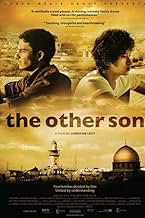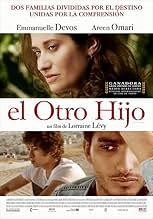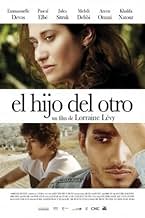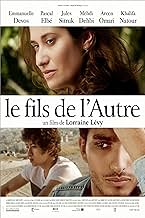IMDb-BEWERTUNG
7,3/10
3852
IHRE BEWERTUNG
Zwei junge Männer, ein Israeli und ein Palästinenser, entdecken, dass sie versehentlich bei der Geburt vertauscht wurden.Zwei junge Männer, ein Israeli und ein Palästinenser, entdecken, dass sie versehentlich bei der Geburt vertauscht wurden.Zwei junge Männer, ein Israeli und ein Palästinenser, entdecken, dass sie versehentlich bei der Geburt vertauscht wurden.
- Regie
- Drehbuch
- Hauptbesetzung
- Auszeichnungen
- 2 wins total
Mahmud Shalaby
- Bilal Al Bezaaz
- (as Mahmood Shalabi)
Tomer Offner
- Ilan
- (as Tomer Ofner)
Gilles Ben-David
- Le directeur de l'hôpital
- (as Jill Ben David)
Empfohlene Bewertungen
I'd reached the point some time ago where I stopped watching films about the holocaust and the intractable Palestine-Israel situation. Then I saw a review of this film that suggested something other than bleak, bleak, bleak and get out the razor for humanity's wrist. So I watched it.
It took the life-affirming premise that even in the worst of situations, which the dispossessed Palestinians have been enduring for more than 60 years, people generally want to live, laugh, have friends, love and, most of all, stay alive. Strapping explosives to your chest is NOT the norm there, even for impressionable young men.
What I saw was a very human story of parents and children trying to come to terms with a sudden reversal of reality. Messy, untidy, forcing a rethink of lifelong prejudices in the face of a farcical bureaucratic mix-up.
The mothers ache with a visceral sense of loss. The fathers quietly rage (and in one sequence not so quietly) in their dumbfoundment. The kid sisters take people as they find them. The boys are stupefied .. to begin with. Then the everyday takes over. Having to absorb it all, then go on living. And all get wiser, a little more worldly, a little less inclined to stereotype. A little richer.
Unlikely? I don't think so. As has often been observed, "Travel broadens the mind." And there's nothing like a good emotional somersault to do exactly that. People can and do change. It didn't feel like a film, more like watching through hidden cameras as life unfolds.
It took the life-affirming premise that even in the worst of situations, which the dispossessed Palestinians have been enduring for more than 60 years, people generally want to live, laugh, have friends, love and, most of all, stay alive. Strapping explosives to your chest is NOT the norm there, even for impressionable young men.
What I saw was a very human story of parents and children trying to come to terms with a sudden reversal of reality. Messy, untidy, forcing a rethink of lifelong prejudices in the face of a farcical bureaucratic mix-up.
The mothers ache with a visceral sense of loss. The fathers quietly rage (and in one sequence not so quietly) in their dumbfoundment. The kid sisters take people as they find them. The boys are stupefied .. to begin with. Then the everyday takes over. Having to absorb it all, then go on living. And all get wiser, a little more worldly, a little less inclined to stereotype. A little richer.
Unlikely? I don't think so. As has often been observed, "Travel broadens the mind." And there's nothing like a good emotional somersault to do exactly that. People can and do change. It didn't feel like a film, more like watching through hidden cameras as life unfolds.
Baby switching error at hospital is the same motif with "Like Father, Like Son", but these movies have completely different viewpoints. In case of "Like Father, Like Son", as the wrongly switched children are still very young, the story is told from the parents viewpoint. The key question asked in the movie is: what makes the parent-child relationship true, under the biological relationship is denied. On the other hand, in case of "The Other Son", the wrongly switched children are already 18 years old, intelligent, tough-to-fudge youths. Furthermore, one is a Jew and the other is a Palestinian. Therefore, in this movie the story is told from both of parents' and children's viewpoints, more on the children's viewpoint. Thus, the title of the movie can be "The other parents" or "The other self" too.
In general, in the movies where a family faces an extraordinary problem, fathers are less reliable than mothers. In this movie too, the first reaction of the two fathers is to deny the fact. They try to think as if nothing happened. Mothers, however, immediately face the issue, share empathy with the other. Well, I am a man, but I have to agree with this development. The plot is simple. Both parents do not have complicated private background. Still, this is a heart-moving one. The most impressing scene for me was that Joshua suddenly sings at the dinner. Is it a Palestinian song?
In general, in the movies where a family faces an extraordinary problem, fathers are less reliable than mothers. In this movie too, the first reaction of the two fathers is to deny the fact. They try to think as if nothing happened. Mothers, however, immediately face the issue, share empathy with the other. Well, I am a man, but I have to agree with this development. The plot is simple. Both parents do not have complicated private background. Still, this is a heart-moving one. The most impressing scene for me was that Joshua suddenly sings at the dinner. Is it a Palestinian song?
There is the intense interplay between the pain of the sons and the pains of their parents simultaneously being explored with the back drop of the apartheid and mutual hatred caused by separation and discrimination. You can see this in verbal confrontation between the fathers, each with their own valid views, each honest men trying to do right by their families.
The transformation f both sons and the human connections on all levels would give hope for a peace but for the fact that in reality, the wall exists and there is only hardening of sides going on. The overall character and plot development of this movie is excellent. The lack of card board villains gives the movie a much more honest texture.
The transformation f both sons and the human connections on all levels would give hope for a peace but for the fact that in reality, the wall exists and there is only hardening of sides going on. The overall character and plot development of this movie is excellent. The lack of card board villains gives the movie a much more honest texture.
While the world continues to struggle to understand the constant schism between Palestine and Israel and yet permutations of that unsettled hot fire whose coals continue to smolder between aggressive flares, along comes a film such as this one - THE OTHER SON or Le fils de l'autre - and provides some insights that at least for the moment offer a better understanding of a very long struggle. Based on an idea by Noam Fitoussi who wrote the screenplay with Director Lorraine Lévy and Nathalie Saugeon, this is a gentle film about resolution of conflict - at least on the family level. It is a French production filmed in the West Bank and Israel under the sensitive direction of Lorraine Lévy.
It's not uncommon for those who rightly resent being biologically categorized on government questionnaires, to defiantly write in 'human' when asked to indicate their race. And the same holds true in its own compelling but curious way for the switched at birth DNA-driven identity crisis drama, The Other Son.
The relative stability of the two families in question - the Israeli Silbergs (Emmanuelle Devos and Pascal Elbéand) the Palestinian Al Bezaaz (Areen Omari, Khalifa Natourkin, and older son Mahmud Shalaby) in the West Bank - is shaken up when eighteen year old Joseph Silberg (Jules Sitruk) puts his musical aspirations on hold to report for mandatory military duty. But an army blood test confirms that he could not be the child of his parents, an odd stratagem, that a military on such permanent alert would be so thorough, especially since Joseph's father is a high ranking commander. But during a Gulf War missile attack near the Haifa hospital where Joseph was born, a Palestinian mother gave birth at the same time. And in the ensuing confusion, the babies must have been released to the wrong women. Joseph's distraught parents first waver, then seek out the Al Bezaaz family. And Yacine (Medhi Dehbi), their designated 'other son' in question, who has returned home for a visit from his medical school studies in France. While alternately fearful and hopeful mixed emotions become entangled, compounded by a profound cultural divide along with two fathers into deeply disapproving denial. Yet it is the coming together of the three 'brothers' that offers a ray of nope that in time this festering conundrum may be resolved.
The cast is splendid, especially Jules Sitruk and Medhi Dehbi whose humanity holds the story together. Highly recommended. In French, English, Arabic, and Hebrew with subtitles.
Grady Harp
It's not uncommon for those who rightly resent being biologically categorized on government questionnaires, to defiantly write in 'human' when asked to indicate their race. And the same holds true in its own compelling but curious way for the switched at birth DNA-driven identity crisis drama, The Other Son.
The relative stability of the two families in question - the Israeli Silbergs (Emmanuelle Devos and Pascal Elbéand) the Palestinian Al Bezaaz (Areen Omari, Khalifa Natourkin, and older son Mahmud Shalaby) in the West Bank - is shaken up when eighteen year old Joseph Silberg (Jules Sitruk) puts his musical aspirations on hold to report for mandatory military duty. But an army blood test confirms that he could not be the child of his parents, an odd stratagem, that a military on such permanent alert would be so thorough, especially since Joseph's father is a high ranking commander. But during a Gulf War missile attack near the Haifa hospital where Joseph was born, a Palestinian mother gave birth at the same time. And in the ensuing confusion, the babies must have been released to the wrong women. Joseph's distraught parents first waver, then seek out the Al Bezaaz family. And Yacine (Medhi Dehbi), their designated 'other son' in question, who has returned home for a visit from his medical school studies in France. While alternately fearful and hopeful mixed emotions become entangled, compounded by a profound cultural divide along with two fathers into deeply disapproving denial. Yet it is the coming together of the three 'brothers' that offers a ray of nope that in time this festering conundrum may be resolved.
The cast is splendid, especially Jules Sitruk and Medhi Dehbi whose humanity holds the story together. Highly recommended. In French, English, Arabic, and Hebrew with subtitles.
Grady Harp
Two teenage boys and their families, living on either side of the Israeli-Palestinian border, come to know that the boys were accidentally switched after their birth in a hospital. Such a situation set across such an enmity-filled landscape could very well be expected to escalate into chaos and violence, but thankfully, the uneasy situation and the extraordinary story is well handled, and without being melodramatic.
Lorraine Levy skilfully and essentially makes it a general human story, getting past its national and traditional boundaries. It tries to question identity in the face of change; genetics vs upbringing, religion, goals, where do we actually belong?, and what actually matters? The two teenage leading characters in the movie, Joseph and Yacine, deal with the situation and these questions with a certain level of maturity and sensibility, which comes from their background of education and non-inclination towards religious extremism. It also helps that the two sets of parents are intelligent and good-willed people who guide the boys to an informed and sensible transition. And that's where the beauty of the story lies.
The acting by the two leads, Jules Sitruk and Mehdi Dehbi, and the remaining cast is commendable, but it's Emmanuelle Devos, as Joseph's mother, who stands out from the rest. The scene in which the details of the birth-switching is disclosed to the two families is quite heart-rending. And the scene in which Joseph, in a moment of inspiration, starts singing an Arabic song in front of his birth-family to distract everyone from the awkward atmosphere, is quite delightful.
(A particular song used in the trailer as well as the movie, Yael Naim's 'My Dreams', is quite a beautiful and meaningful one)
Lorraine Levy skilfully and essentially makes it a general human story, getting past its national and traditional boundaries. It tries to question identity in the face of change; genetics vs upbringing, religion, goals, where do we actually belong?, and what actually matters? The two teenage leading characters in the movie, Joseph and Yacine, deal with the situation and these questions with a certain level of maturity and sensibility, which comes from their background of education and non-inclination towards religious extremism. It also helps that the two sets of parents are intelligent and good-willed people who guide the boys to an informed and sensible transition. And that's where the beauty of the story lies.
The acting by the two leads, Jules Sitruk and Mehdi Dehbi, and the remaining cast is commendable, but it's Emmanuelle Devos, as Joseph's mother, who stands out from the rest. The scene in which the details of the birth-switching is disclosed to the two families is quite heart-rending. And the scene in which Joseph, in a moment of inspiration, starts singing an Arabic song in front of his birth-family to distract everyone from the awkward atmosphere, is quite delightful.
(A particular song used in the trailer as well as the movie, Yael Naim's 'My Dreams', is quite a beautiful and meaningful one)
Wusstest du schon
- VerbindungenReferenced in Madame empfiehlt sich (2013)
Top-Auswahl
Melde dich zum Bewerten an und greife auf die Watchlist für personalisierte Empfehlungen zu.
- How long is The Other Son?Powered by Alexa
Details
- Erscheinungsdatum
- Herkunftsland
- Offizieller Standort
- Sprachen
- Auch bekannt als
- The Other Son
- Drehorte
- Produktionsfirmen
- Weitere beteiligte Unternehmen bei IMDbPro anzeigen
Box Office
- Bruttoertrag in den USA und Kanada
- 1.285.918 $
- Eröffnungswochenende in den USA und in Kanada
- 125.691 $
- 28. Okt. 2012
- Weltweiter Bruttoertrag
- 3.820.405 $
- Laufzeit1 Stunde 45 Minuten
- Farbe
- Sound-Mix
- Seitenverhältnis
- 2.35 : 1
Zu dieser Seite beitragen
Bearbeitung vorschlagen oder fehlenden Inhalt hinzufügen

Oberste Lücke
By what name was Der Sohn der Anderen (2012) officially released in Canada in English?
Antwort






























